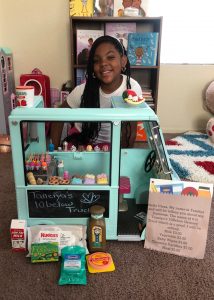By Michael Niehoff
Education Content Coordinator, iLEAD Schools
Around the world, a dynamic discussion is taking place. Many people are working to identify and nurture the skills students will need to be successful in a globalized, gig-oriented economy. One solution is for educators to facilitate entrepreneurial learning experiences and opportunities to foster an “entrepreneurial mind-set” — a way of thinking that enables learners to overcome challenges, be decisive, accept responsibility for outcomes, improve skills, learn from mistakes and take action on their ideas.
At iLEAD Antelope Valley, the 2nd grade facilitators recently helped develop their learners’ entrepreneurial mind-set through a Business Start-up Project. According to facilitator Kristy Basty, they chose to do this project for many reasons. She said she wanted her learners to work to solve a problem or need through business ideas that were creative, innovative and responsive to community needs.
“We really wanted them to take a closer look at their community and see how it’s been affected by the pandemic,” Basty said.
“We wanted to see if they could develop business ideas that would be relevant now and in the future.”
Basty and her team also wanted to implement a project that involved multiple subjects, including math and financial literacy, and that gave learners a great deal of voice and choice.
“We wanted the businesses to be their ideas that they believed would be beneficial to others,” Basty said. “The project focused on social entrepreneurship.”
Basty said the learners engaged in deep discussions with facilitators about how the pandemic has made it very hard for businesses to stay open and survive. The learners made a deep connection with what they were learning and creating.
“It allowed them to critically think about real-life situations and create a business plans with real-world problems in mind,” Basty said.
Ultimately, the facilitators were pleased with both the ideas and final products, as well as the skills the learners demonstrated.
“We saw skill growth in math, engineering, public speaking and critical thinking,” Basty said.
Entrepreneurial projects and experiences allow learners to think outside the box, according to Basty. They allow learners the freedom to show a deeper level of thinking.
“The process of developing a business plan instills the importance of planning ahead,” Basty said. “The more detailed the plan, the more successfully the product will come together. This can be applied to many aspects of their lives moving forward.”
Basty shared a few project examples from the learners.:

Robot Lego Pick-up: “This learner designed a robot that would pick up Legos quickly from the floor. The rationale as to why this would be helpful was, ‘I play Legos a lot now at home and it hurts my mom’s feet when she steps on them.’ While many learners are stuck indoors, we thought this was a great idea to save the comfort of our feet from Legos on the floor. When in the classroom, Legos definitely take the longest to clean up, and some are always missed!”
EJJ Company (Enjoy Joel’s Juice): “This learner decided to create a product that could improve the health of our eyes. He created three different flavors of carrot juice and made carrot cake as well. His reasoning behind his business plan was to create something to help our eyes, since most of us are constantly on the computer all day and it is important to keep our eyes healthy. We loved this idea and were treated to delivered samples as well.”
Fellow 2nd grade facilitator Silvia Mora thought all the learners had high-quality experiences and the online environment worked as well for this project as it would in person.
“We were impressed with the videos and slideshow presentations learners created to advertise and showcase their products and services,” Mora said. “What I really loved is that they learned some very practical skills about how to start up and run an actual business. It’s a valuable experience for them.”
Basty said that this project was extremely successful and she hopes to repeat it with future learners. “We were incredibly proud of the whole 2nd grade cohort during the entire process of this project,” Basty said. “We continue to be amazed at their ability to create and develop projects that promote higher-level thinking when given the opportunity to do so.”